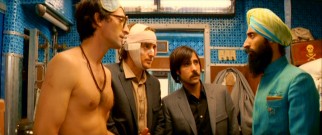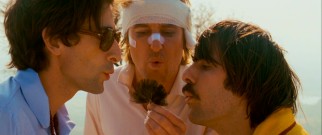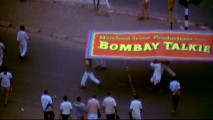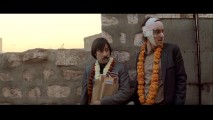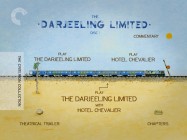The Darjeeling Limited: The Criterion Collection DVD Review
 |
The Darjeeling Limited
Theatrical Release: September 29, 2007 / Running Time: 91 Minutes (104 Minutes with short) / Rating: R Director: Wes Anderson / Writers: Wes Anderson, Roman Coppola, Jason Schwartzman Cast: Owen Wilson (Francis Whitman), Adrien Brody (Peter Whitman), Jason Schwartzman (Jack Whitman), Anjelica Huston (Patricia Whitman), Amara Karan (Rita), Wally Wolodarsky (Brendan), Waris Ahluwalia (The Chief Steward), Irrfan Khan (The Father), Barbet Schroeder (The Mechanic), Camilla Rutherford (Alice), Bill Murray (The Businessman), A.P. Singh (Taxi Driver), Kumar Pallana (Old Man), Dalpat Singh (Waiter), Trudy Mathis (German Lady #1), Margot Godros (German Lady #2), Natalie Portman (Jack's Ex-Girlfriend) |
Buy on DVD from Amazon.com • Buy on Blu-ray from Amazon.com
The Darjeeling Limited may be Wes Anderson's least well-known film to date. Only The Royal Tenenbaums has come close to commercial potency among the writer/director's six distinctive quirky dramedies, but 2007's Darjeeling ended up Anderson's least-distributed and lowest-grossing film since his 1996 debut, Bottle Rocket. Though that film barely got a theatrical run, Rushmore and Tenenbaums inspired many to go back and see what they missed. Of course, even Anderson's least appreciated film has won more esteem than many a filmmaker's best-known work.
No one's shown their esteem for Anderson as much as The Criterion Collection. Next week, the line devoted to important films from around the globe welcomes Darjeeling into its ranks. Available in a 2-disc DVD and a single-disc Blu-ray (the movie's first), Darjeeling becomes the fifth Anderson film admitted into the selective series, claiming spine #540. As a big fan of Anderson's filmmaking, I think it's great that he's so well-represented in the Criterion canon. They seem like a perfect match for one another. But recognizing that he is not everyone's cup of tea, I can imagine that Criterion enthusiasts who aren't big on his movies (probably not a huge overlapping audience) are sick and confused that everything he makes is deemed Criterion-worthy.
The Darjeeling Limited is meant to be watched after the short film Hotel Chevalier, whose end credits call it "Part 1 of The Darjeeling Limited" before giving it a copyright date two years prior to the feature. Upon first viewing, Hotel Chevalier doesn't make a great deal of sense. It centers on a young man (Jason Schwartzman) who has been living in a fancy Parisian hotel for an undetermined but considerable time. The ex-girlfriend (Natalie Portman) from whom he is evidently escaping phones him, announcing that she's found him and is now on her way to see him. Though there is clearly a history of pain between them, the man doesn't discourage the visit, which is brief, awkward, and sexual. The aforementioned credits are rolled and first-time viewers' heads are probably scratched.
Schwartzman's hurt hotel dweller, short story writer Jack Whitman, is one of three grown brothers reuniting after a year apart in the feature film. Eldest son Francis (Owen Wilson) arranges the trip through India on the titular train, in hopes of bringing the estranged siblings closer and treating them to some spiritual and cultural enlightenment. To the brothers' emotional wounds, Francis adds physical damage, having narrowly survived a terrible motorcycle crash. Middle son Peter (Adrien Brody) barely makes the train, leaving behind a wife who's seven and a half months pregnant. This is one of a number of secrets the Whitmans share in misplaced confidence. The men also share locally acquired pain remedies and some complimentary sweet lime juice.
The trip is meticulously planned by Francis, who provides his brothers with laminated itineraries to make the most of their stops. The itineraries and their lamination actually come from Brendan (Wally Wolodarsky), his alopecic assistant who is supposed to remain unseen, but doesn't for very long. The brothers explore street vendors and holy places, lighting candles, ringing bells and saying prayers, but still squabbling over petty things, like why Peter has inherited their late father's possessions.
The Whitmans' parents actually loom largely over their abroad sons, with their father's funeral being the last time they saw one another. Furthermore, it's revealed that Francis' real purpose for the journey is for the boys to see their mother (Anjelica Huston), who has fallen out of contact and become a nun in the Himalayan mountains.
Probably the film's strongest feature is its deceptive minimalism. It may seem like not a lot of consequence happens, but in fact, everything that occurs has consequence and even the past incidents we only hear about are still rippling through the complex protagonists. This is an aspect common to Wes Anderson's films and it's critical to viewers' appreciation of them. All this may sound awfully heady and pretentious, and yet The Darjeeling Limited is a comedy. Not only that, but it's an extremely funny one. Watching a movie you've already seen multiple times in solitude (as I did for this review) isn't typically a recipe for guffaws, and yet I couldn't help but laugh out loud at some of the ridiculous interactions among the main characters and those they encounter. Anderson, who wrote this screenplay with Schwartzman, the star of his acclaimed breakout film Rushmore, and Schwartzman's first cousin Roman Coppola (son of the famed Francis Ford and Eleanor), has a remarkable sense of humor that almost defies analysis or explanation. It's all in the off beats and timing, which would mean nothing if not filtered through strong, perfectly-cast characters.
Comedies seem to have a stigma and a short shelf life to them because most are just about going for laughs. There's nothing wrong with that. We need levity in film as much as anywhere. But pair a sense of humor with an exquisite knowledge and passion for cinema and the results can be astounding. I can understand people not getting or liking Anderson's movies (I found the Brody-starring caper The Brothers Bloom, clearly aspiring for a similar aesthetic, frankly detestable), but you can't claim that Anderson doesn't know or care about what he's doing. So much thought and ambition goes into one of his movies that one can't blame him for being too busy or exhausted to make more than one film every three years.
I've yet to encounter an Anderson film that hasn't grown on me on return visits and, just three years after its release, Darjeeling Limited strongly supports that tradition. Rich, riveting, and with sound reasoning behind every one of its many quirks, this is as much of a modern classic as any of the director's. Even something that struck me as self-indulgent, the use of music from relatively obscure Indian films from Satyajit Ray and Merchant Ivory, seems to make perfect sense this time around. Anderson sought to make a movie that felt like the ones that inspired him, so why try to have, say, Mark Mothersbaugh create something that sounds like their scores when he can use the actual scores, dated recordings and all?
Setting aside Fantastic Mr. Fox for its adapted nature and different medium (both of which seem minor, considering how comfortably it fits into Anderson's oeuvre), I think that The Royal Tenenbaums may be the director's strongest film and The Life Aquatic with Steve Zissou may be his weakest. I'm due to revisit both and I have a feeling I just might find that the distance between them and all the others is shrinking, with each solidifying an enduring, utterly satisfying place among modern film.
With Criterion giving Anderson so much recognition, one can't help but wonder when the Academy Awards might do the same. In a different year (especially one before Pixar settled into its annual release schedule), Fantastic Mr. Fox would have been the film to beat for the Best Animated Feature Oscar. But even that award feels like a minor league way to honor one of the most brilliant minds in filmmaking today. I look forward to seeing whatever is next from him and his troupe.
VIDEO and AUDIO The Darjeeling Limited looks outstanding in Criterion's newly-mastered 2.40:1 anamorphic widescreen DVD transfer. True, the majority of modern movies are short on picture and sound flaws, at least on my modest 42" widescreen plasma TV. But Criterion's work here is impressive even by the highest of standards. Admittedly, I'm coming to this release from an overly compressed single-layered DVD-R advance Fox screener, which doesn't take much to beat. Still, the visuals dazzle with their vibrant colors and exotic sights. The Dolby Digital 5.1 soundtrack is also without complaint. Dialogue is by far the most active element and it comes across crisply and naturally. In addition to the sampled Indian movie scores with their aged sound, the film makes solid use of Anderson's evidently favorite type of music, rock from British Invasion bands. Prominently and aptly featured are three songs from The Kinks' 1970 concept album Lola Versus Powerman and the Moneygoround, Part One (set to Anderson's signature slow motion), The Rolling Stones' "Play With Fire" in a powerful climactic scene, and Peter Sarstedt's "Where Do You Go To (My Lovely)" as basically the third lead of Hotel Chevalier.
BONUS FEATURES, MENUS and PACKAGING Disc 1's main bonus feature is an audio commentary on the film by Wes Anderson and his co-screenwriters Roman Coppola and Jason Schwartzman. Though much of it is simply commenting on the circumstances behind what's on screen (locations, extras, and the like), the track remains amusing and informative thanks to the group's candor. There are many good notes about the process of writing abroad and "traveling in character", with various bits in the film linked to real experience. We also get a human sense of production in exotic flight and airplane stories. Finally, in a bit of whimsy not unfamiliar to listeners of past Anderson commentaries Anderson alone comments on the already-discussed short, which can be accessed on its own (13:10) but is intended as a prelude to the film. Beyond that, Disc 1's only other bonus feature is the film's nice, soundtrack-showcasing theatrical trailer (2:16). The most prominent listing on Disc 2 is for Barry Braverman's documentary "The Making of The Darjeeling Limited" (40:45). This avoids interviews altogether, instead granting us terrific fly-on-set access to this overwhelming production. The crowds and traffic of outdoor sequences, challenges and limitations of shooting on a train, language barriers, and production design minutiae all reveal what an undertaking filming this movie in India was and what an accomplishment that it turned out so good. It also shows just how much Anderson sweats the small stuff, rendering his directing of Fantastic Mr. Fox by video link all the more curious. This is a solid companion piece, sharply edited down from what must be many dozens of hours of B-roll footage.
"Conversation with James Ivory" (20:44) shows us a 2010 Parisian restaurant meeting between Wes Anderson and the director of the famed Merchant Ivory team, whose film scores provide a large part of The Darjeeling Limited's music. We get clips of some of the English-language Indian productions paid homage as part of a discussion of the bodies of work of Merchant Ivory and the late, equally-sampled Satyajit Ray. It's a real treat to see some of these films that clearly inspired Anderson. Critic and longtime Anderson fan Matt Zoller Seitz talks over clips from the film in his welcome essay "Dream Train: Chaos and Control in The Darjeeling Limited" (11:45). He gives us a smart, deep reading of the Whitman brothers, their film and the short that he considers part of it, down to deconstructing potent scenes. A deleted scene shows the Whitman brothers joining the local youth in a game of cricket played with a tennis ball. It's followed by two alternate takes, the more amusing of which shares gibberish dialogue that goes seen but not heard in the film. Altogether, the three bits run just 3 minutes and 20 seconds. "Waris' Diary" consists of ten short videos shot by and featuring actor Waris Ahluwalia. These glimpses of production are more amusing than revealing, with footage that includes Jason Schwartzman cooking and shots of animals identified with yellow text and moving arrows. The clips run between 18 seconds and 2 1/2 minutes (running 11:32 overall), plus there is a collection of 50 Polaroids.
The first of three Stills Galleries present over 105 shots captured by on-set photographer James Hamilton. The other two offer ten pictures from Owen Wilson's mother Laura Wilson and ten from Adrien Brody's mother Sylvia Plachy. These candid personal photos give us an interesting feel for the production. For most artists, making an American Express commercial might feel like selling out. For Wes Anderson it is an opportunity to celebrate his calling. This 2-minute ad is unconcerned with credit cards, instead following the director across the believably chaotic set of a fictional film dripping with his kind of ambition and quirk. Jason Schwartzman and Waris Ahluwalia appear as the actors. "Sriharsh's Audition" (2:38) is a clip of young actor Sriharsh Sharma emoting and singing Green Day's "Boulevard of Broken Dreams" above much background noise. It looks oh so uncomfortable, but Sriharsh won the coveted role of Boy with Handkerchief, so this ought to inspire Indian children looking to land American film parts. "Trophy Case" is a humorous 40-second short on the two major awards the film won.
"Roman Coppola's Sketch" (2:28) provides video and photos of the film's writing process in India set to electronic tabla music. Lastly, there is a video of sixth grader Oakley Friedberg's "My Trip to India" presentation (3:30) with supplemental photos. Presumably the son of production designer Mark Friedberg, Oakley explains to his Packer Collegiate Institute classmates what he did and learned while his Dad was at work on The Darjeeling Limited. Slight though Fox's original DVD was, one extra from it goes missing in the jump to Criterion: Barry Braverman's 21-minute "The Darjeeling Limited Walking Tour". This took a similar approach as the main documentary included here and some of the same footage is seen in both. In typical Andersonian fashion, each disc's main menu animates a childlike train pulling into a dessert, the work of Wes's illustrator younger brother Eric Chase Anderson. Though the pages are otherwise static, they're equipped with day and night ambient noises, respectively. That design carries over to the packaging, whose nice children's storybook-like artwork isn't even covered with a more marketable slipcover as on two of the Buena Vista-distributed Anderson Criterion DVDs. Inside the clear keepcase is a booklet resembling one of the monogrammed inherited animal suitcases from the film. It folds out to 16 pages that provide credits, chapters, and transfer information on one side. The other side supplies "Voyage to India", an 8-page, 3-chapter essay by The New Yorker critic Richard Brody (no relation to Adrien). Unlike the sometimes pretentious articles Criterion includes on older films, this one is written as much about the production methods as the story, craft, and subtext. It's an excellent read.
CLOSING THOUGHTS While I quite liked The Darjeeling Limited in my first couple of viewings, revisiting it three years later has produced in me an even deeper appreciation for it. That can probably be chalked up to two reasons: 1) Wes Anderson's movies always improve with subsequent screenings and 2) the context provided by a Criterion Collection DVD makes it easy to notice, process, and interpret things in new ways. A Criterion DVD can't make a bad film good (which may be why they tend to stay away from those), but it can make a good film even better by making you aware of subtle facets and unclear intentions that may go missed in a basic viewing. There isn't an overwhelming amount of bonus features, but almost everything that's here is great. Though this set will cost you a lot more than the movie's now bargain bin-priced Fox disc, it provides the deluxe, substantive treatment that this deserves about as much as any of the director's fine films. I recommend that you see the movie and if you like it, you pick up this edition on either format at some point. Currently the Blu-ray is selling for a lot less than the DVD on Amazon; Criterion seems to be the only studio with horse sense when it comes to handling pricing and content on the two formats. More on the DVD / Buy from Amazon.com / Buy on Blu-ray / Buy Original Fox DVD
|
Related Reviews:
DVDizzy.com | DVD and Blu-ray Reviews | New and Upcoming DVD & Blu-ray Schedule | Upcoming Cover Art | Search This Site
Written and Directed by Wes Anderson: Bottle Rocket • The Life Aquatic with Steve Zissou • Fantastic Mr. Fox
New: The Thin Red Line (Criterion Collection) • Beauty and the Beast (Diamond Edition) • The Karate Kid (2010)
Greenberg • North by Northwest • Bride and Prejudice • The Jungle Book • New York, I Love You • Where the Wild Things Are
Owen Wilson: The Wendell Baker Story • Cars | Jason Schwartzman: Funny People • Shopgirl | Adrien Brody: The Experiment • The Village
2007 Movies:
No Country for Old Men • There Will Be Blood • Juno • Ratatouille • Into the Wild
Margot at the Wedding • Gone Baby Gone • In the Valley of Elah • Things We Lost in the Fire



